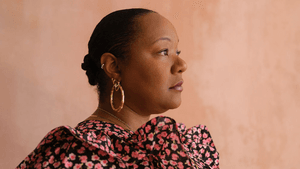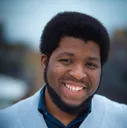Looking forward to the 2023 BlackStar Film Festival, August 2-6
The art of possibility with BlackStar Projects and Maori Karmael Holmes

Maori Karmael Holmes, the founder of BlackStar Projects, was recently awarded the 2023 Berresford Prize, an unrestricted $50,000 award given annually to a cultural practitioner who has contributed to the advancement, well-being, and care of artists in society. This recognition, awarded by the national arts-funding nonprofit United States Artists, came as a surprise to her, but not to those in her circle. An innovator in building community rooted in film and branching into other creative mediums, Holmes is no stranger to curating and cultivating experiences.
With the BlackStar Film Festival right around the corner (August 2-6, 2023), I sat down with Holmes to talk about the award, what all she’s been up to, what she’s excited about with the film festival (and beyond), and what is falling into alignment for her.
Moving pictures
BlackStar is entering its 12th year, and this edition is a special one. “The festival is taking place in Center City on Broad Street this year,” Holmes said, a flutter of joy at the hinge of her words. “That’s a huge physical change coming from 11 festivals in University City. The vibe is different.”
The festival will post up at the Kimmel Cultural Campus, Suzanne Roberts Theatre, Lightbox Film Center, and the Barnes Foundation, a departure from its inaugural home (through 2019) at the International House on UPenn’s campus. Holmes said the move is more than a change of scenery—the new venues will bring kinetic energy.
“There will be the people who have been coming forever, and they make sure they’re here, and then people passing by on the street are going to see it and say, hey, what’s going on here?” This is a welcome evolution; especially after the challenges of 2020 and beyond, the founder needed to retool her role.
“I don’t do it all,” she said. Not anymore. Holmes was the lead programmer of the film festival and the editor-in-chief of Seen, a journal of film, art, and visual culture that BlackStar publishes twice a year (I highly recommend subscribing). They’ve launched the Philadelphia Filmmakers Lab and the annual William and Louise Greaves Filmmaker Seminar. She is the host of the Many Lumens podcast, which launched at the beginning of 2021. But in 2020, Holmes found herself burnt out. There was a struggle to keep up with the process of the film festival, and she had to admit to herself that “I’m overwhelmed … I can’t weigh in.”
Hard work isn’t always sustainable.
The power of rest
Holmes is proud of advocating mindfulness around rest, not only for herself, but for everyone who works at BlackStar: “As an organization, we’re really trying a new model of working, offering wellness stipends and unlimited time off.” BlackStar also makes space and time for rest after the film festival and for a longer rest at the end of the year, and staff are encouraged to take time off when they need to. It’s not always easy to practice what you preach, but Holmes is intentional with finding her own moments of restoration, too. “I try not to work on the weekends as much as possible,” she said with a short laugh. She mentioned practicing yoga and better nutrition, too.
She’s also delegating roles. Since 2020, she’s no longer the lead programmer of the film festival. The process wasn’t a doddle—she had to have real conversations with herself and her colleagues about what she was and wasn’t capable of or what she didn’t have the space or energy for. She had to delegate, which can be risky and vulnerable. However, it has proven abundantly fruitful for her, her team, and BlackStar’s community, audience, and the artists and creators they put forward. BlackStar Projects thrived in 2020 despite her stepping back, which is a feat for anyone in the early days of Covid-19, a testament to the team she’d already brought together. They believed in her vision. The value of BlackStar is clear, and the flame refused to wane.

Collective genius
This reminds me of Chetna Mehta’s perspective on “genius” (catch it on episode 62 of the Black Girl in Om podcast): “In a lot of Indigenous cultures … they believe that creativity didn’t come from one individual, it comes from an external disembodied divine source that comes to us when we’re open and willing and ready and sometimes when we’re not. But it comes to us, and it’s our job as humans in bodies with fingers and hands and talents to listen and translate.” These cultures believe that genius rests in these forces, not the individual—no one person is a genius, but instead, people all have geniuses. These forces of genius are our ancestors, and “that is the collective force that we can tap into and the source that is accessible and available to all of us.”
To me, Holmes is channeling the genius of the ancestors of Black, brown, and Indigenous people, cultivating a collective force that went from a local niche film festival to an internationally recognized cultural movement.
More than hope
“I am someone who is really driven by a kind of ever-present curiosity … and a lot of fire in my [astrological] chart,” she quipped early in our interview. That starry fire is ever-present within BlackStar, planted as a seed in the beginning and blooming into an integral platform for Black, brown, and Indigenous artists, creators, and curators.
“For the first nine festivals, I was the lead programmer, so it definitely was based on my own interests, but it wasn’t without that feedback loop from the community” to infuse different voices and expand the audience. “I think it isn’t just about the art for me, for us, it’s about justice also, and how we can’t make work without thinking about how it impacts a wider audience.”
BlackStar’s future is bright, and it’s because of the immense, sightly fire that has already been lit. The brightness is more than hope, too: “I felt like I’ve had some things put on me that I had to shatter; I had opened the portal, I had to learn how to continue pushing along.” The platform feels like a “tremendous responsibility,” and while “It’s not hope exactly … I think it’s possibility that keeps me going. Maybe they’re related?”
Hope feels like the byproduct of possibility. To know what is possible, first, you have to see it. And because of BlackStar and Holmes, the possibilities for BIPOC filmmakers and artists are dazzlingly lucid.
What, When, Where
BlackStar Film Festival. Presented by BlackStar Projects. August 2-6, 2023. Various prices and venues. blackstarfest.org.
Accessibility
This year’s festival takes place at multiple venues. See the accessibility page for more information.
Sign up for our newsletter
All of the week's new articles, all in one place. Sign up for the free weekly BSR newsletters, and don't miss a conversation.

 Kyle V. Hiller
Kyle V. Hiller